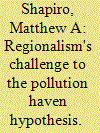| Srl | Item |
| 1 |
ID:
162321


|
|
|
|
|
| Summary/Abstract |
By considering spatial relationships, this study aims to analyse to what extent per capita CO2 emissions are determined by renewable energy consumption, the share of the services sector in GDP, energy intensity and real per capita income. A panel data set composed of 173 countries over the 1990–2014 period is used to estimate an environmental Kuznets curve (EKC) augmented by neighbouring per capita income and energy intensity. Both standard and spatial forms are estimated for seven different sets of countries to assess the robustness of the results. Finally, several forecasts are performed to verify global sustainability and to provide some policy suggestions for the period 2015–2100. The empirical results indicate that (i) most areas support the standard EKC, (ii) there seems to be an inverted U-shaped relationship between neighbouring per capita income and national per capita emissions in Europe, Asia and the World as a whole, (iii) neighbouring energy intensity increases national per capita emissions, and (iv) forecasts show that economic growth will accelerate climate change. However, a steady annual growth in renewable energy consumption and a steady decrease in energy intensity, both close to 2.5%, may guarantee environmental sustainability prior to 2100.
|
|
|
|
|
|
|
|
|
|
|
|
|
|
|
|
| 2 |
ID:
171517


|
|
|
|
|
| Summary/Abstract |
One important and frequently-raised issue about foreign direct investment (FDI) is the potentially negative consequences for the environment. The potential environmental cost due to increased emissions may undermine the economic gains associated with increases in FDI inflow. Although the literature is dominated with this adverse view of FDI on the environment, there is also a possibility that FDI can contribute to a cleaner environment, especially, if FDI comes with green technologies and this creates spillovers for domestic industries. Theoretically, the effect of FDI on the environment can be negative or positive. To deal with the theoretical ambiguity about the FDI-environment nexus, many empirical studies have been conducted but their results only reinforce the controversy as they produce contrasting results. We conduct a meta-analysis of the effect of FDI on environmental emissions using 65 primary studies that produce 1006 elasticities. Our results show that the underlying effect of FDI on environmental emissions is close to zero, however, after accounting for heterogeneity in the studies, we find that FDI significantly reduces environmental emissions. Results remain robust after disaggregating the effect for countries at different levels of development as well as for different pollutants.
|
|
|
|
|
|
|
|
|
|
|
|
|
|
|
|
| 3 |
ID:
127795


|
|
|
|
|
| Publication |
2014.
|
| Summary/Abstract |
This paper explores the phenomena of environmental coordination within Northeast Asia. I initially frame the discussion around claims that China is a pollution haven for its neighboring countries, and I look for evidence in the domestic and regional environmental institutions which challenge China's pollution haven status. I find that that there is a science and technology-based epistemic community in Northeast Asia which provides an important theoretical response to counter the pollution haven hypothesis. As well, given its strong science and technological output, Japan is poised to assume leadership of the Northeast Asian environmental regime for at least the short- to medium-term.
|
|
|
|
|
|
|
|
|
|
|
|
|
|
|
|